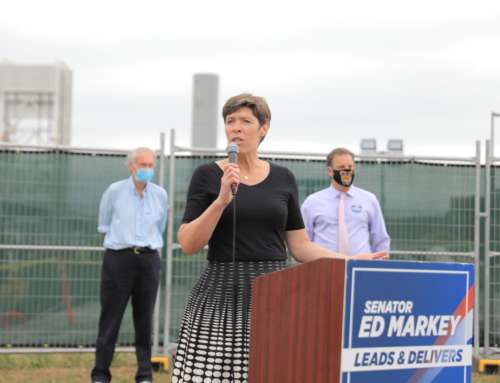(BOSTON) – At the end of October, the Massachusetts House of Representatives passed legislation, An Act relative to immediate COVID-19 recovery needs (H.4219,) that allocates federal funding granted to the Commonwealth for COVID-19 relief from the American Rescue Plan Act (ARPA) and surplus tax dollars from fiscal year 2021.
Funded at $3.82 billion, the bill aims to close gaps exacerbated by the COVID-19 pandemic, encouraging recovery through one-time investments in housing, environment and climate mitigation, economic development, workforce, health and human services, and education. After the original $3.65 billion bill was released, more than 1,100 amendments were filed by legislators, and ultimately four consolidated amendments were added to the legislation.
The House bill includes $500 million to replenish the Unemployment Trust Fund which will offset businesses’ contributions for unemployment programs. The bill also includes $200 million worth of tax relief for small businesses that paid personal income taxes on state or federal relief awards during the pandemic as well as $60 million for grants to support small businesses negatively impacted by the pandemic. To assist recovering cultural organizations and artists, the bill appropriates $125 million to the Massachusetts Cultural Council for grants supporting cultural events, education or performances highlighting underrepresented voices.
Building on the House’s longstanding commitment to support and protect community hospitals, the bill allocates $250 million for financially strained hospitals and $20 million for community health centers. This bill includes more than $250 million for behavioral health and substance use disorder treatment services, including $100 million for workforce initiatives with $15 million specifically for community health centers. The bill also includes over $150 million for local and regional public health systems. In addition, the legislation appropriates more than $78 million to address food insecurity.
For low- and middle-income workers who worked in-person during the COVID-19 State of Emergency, the bill includes $500 million towards providing premium pay bonuses. To promote employment, the bill also includes $150 million to enhance workforce opportunities through workforce skills training, as well as $100 million for vocational and career and technical schools. The legislation also includes a provision that calls for the Department of Unemployment Assistance to establish “a public information campaign to provide notice and promote awareness of the availability of an overpayment waiver related to unemployment insurance benefits overpayments.” This language begins to address an urgent crisis among the Commonwealth’s workers who face unemployment benefit claw-backs. To respond to this crisis, Representative Meschino filed H.4202, which is currently pending before the legislature. More information on the waivers can be found at this link, and more information on H.4202 can be found here.
The bill appropriates funds for affordable housing, with $150 million for public housing maintenance and $150 million to create permanent supportive housing for chronically homeless individuals, families, youth, young adults, survivors of domestic violence, seniors, and veterans. Representative Meschino is working to build on this segment of the spending bill by advocating for legislation (H.3838) that would ensure the long-term viability and sustainability of this new supportive housing pilot line item. Still pending before the legislature, H.3838 would braid public and private funding to meet the needs of homeless individuals, families, and unaccompanied youth across the continuum of care. More information on the bill can be found here.
In a critical move to build upon the House’s commitment to the environment and clean energy, the bill includes investments for environmental infrastructure and development spending, with a focus on environmental justice communities, climate change resiliency and clean energy. This bill includes $100 million for port infrastructure development and revitalization to facilitate economic activity and support the offshore wind industry. Other investments include $100 million toward infrastructure for communities to adapt and become climate resilient; and $100 million for water and sewer projects, including those to remediate combined sewer overflow into waterways.
To improve indoor air-quality in schools and support healthy learning environments, this bill includes more than $100 million for grants to public school districts with high concentrations of low-income students, English language learners, and communities disproportionately impacted by COVID-19. This bill also includes $75 million for capital and maintenance projects for higher education.
“This legislation is a once-in-a-generation opportunity to invest in communities and uplift the residents of the Commonwealth by strengthening existing programs and services,” said Representative Meschino (D-Hull). “As the legislative process moves forward, I will continue to advocate for these relief dollars to benefit our district and support our main street economies.”
The bill left a portion of the total ARPA money unallocated, and the legislature will seek to allocate the rest of this money at a future date.
The Senate version of the bill is being debated this week. To check for updates on this and to follow other legislation, simply create an account on malegislature.gov.
